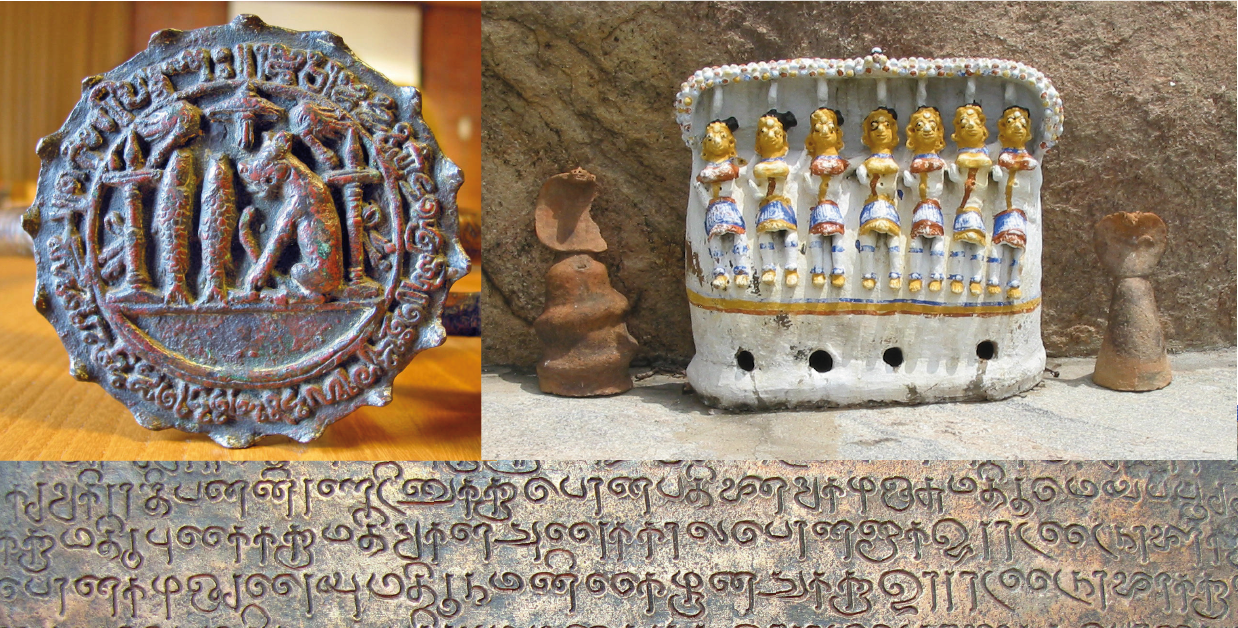Les ateliers du quinquennal 2019-2023 |
Regionalism and cosmopolitanism: Tamil textualities
Coordinator : Emmanuel Francis (CEIAS)
Membres : Nicolas Cane (INALCO), Valérie Gillet (EFEO, Paris), Zoé Headley (CEIAS), Tiziana Leucci (CEIAS), Brigitte Sébastia (CEIAS), Uthaya Veluppillai (INALCO), Ines G. Županov (CEIAS).
Presentation
The workshop "Regionalism and Cosmopolitanism: Tamil Textualities" is an extension of the "Regionalism and Cosmopolitanism: South India" of the previous CEIAS lustrum.
The focus has shifted to Tamil-language texts, taking into account the experience gained in the earlier project which focused on Tamil texts, the evolution of Tamil studies in the Parisian context (arrival, post or assignment of prospective members) and the development of Tamil text corpuses as part of the "Endangered Archives" program (British Library), an initiative of prospective project members.
The current workshop will maintain the original goal of bringing together specialists from different disciplines within the South Indian research context for in-depth investigation and eventual review of the particular and shared features of a regional culture, which, throughout its history, has been part of a dual movement of cosmopolitanism and regionalism. This undertaking will be carried out mainly through the investigation of texts in Tamil language (inscriptions, literature, canonical texts, treatises, administrative documents, etc.).
Three areas of activity are planned:
(1) The workshop will provide a forum for researchers (CEIAS members or not) to present their work to CEIAS as with the previous project. The new workshop scope will be broader than that of the original project assimilating the previous "Regionalism and cosmopolitanism: South India" CEIAS project within it.
(2) The workshop will continue running its existing, eponymous research blog (https://rcsi.hypotheses.org/) publicizing various posts (announcements of conferences, symposia and publications; reviews; posts on ongoing research) for communication and scientific monitoring purposes.
(3) The workshop participants will regularly organize Tamil text focused working seminars to build a collective response from specialists; project members and researchers working on text corpuses in Tamil or other Indian languages. The objective is to create a forum for dialogue and exchange on texts, or a corpus of textual sources, between researchers from different backgrounds and perspectives. In order to reap the benefits of this multidisciplinary approach, it will be necessary to involve the many possible approaches (anthropological, geographical, historical, philological, etc.). Several Tamil corpora studied at CEIAS are already being targeted:
- Medieval inscriptions (N. Cane, E. Francis, V. Gillet, U. Veluppillai).
- Christian manuscripts (I. G. Županov ).
- Siddha medical manuscripts (B. Sebastia). See: EAP 810.
- Agrarian records (Z. Headley). See: D.A.T.A.H., EAP 314, EAP 458, EAP 689.
The workshop participant (project member or not, "textualist" or not, specialist of Tamil or not) will present, in one or more sessions, his corpus, the questions he addresses it with, the approaches (methodological, disciplinary) he adopts to exploit it. Examples of presentation thematics already under consideration include: praise in the Tamil epigraphic corpus; imprecations in agrarian archives.
Les sites du CEIAS
- SAMAJ | The South Asia Multidisciplinary Academic Journal
- CEIAS - Facebook
- CEIAS - Twitter
- CEIAS - Newsletter
- Le Bulletin de la Bibliothèque
- Régionalisme & cosmopolitisme
- DELI | Dictionnaire Encyclopédique des Littératures de l’Inde
- DHARMA | The Domestication of “Hindu” Asceticism and the Religious Making of South and Southeast Asia
- TST | Texts Surrounding Texts
- STARS | Studies in Tamil Studio Archives and Society 1880-1980
- I-SHARE | The Indian Subcontinent’s Shared Sacred Sites
- Sri Lanka et diasporas
- Sindhi Studies Group
- Carnet du Master Études asiatiques
- Master “Asian Studies”
- Social Sciences Winter School in Pondicherry
- Caste, Land and Custom
- Musiques indiennes en terres créoles
 Actualités
Actualités
Devenir juifs : conversions et assertions identitaires en Inde et au Pakistan
 Débat - Mardi 9 mai 2023 - 14:00Présentation« L’an prochain à Jérusalem ! », scande un homme portant une kippa dans une synagogue de Karachi au Pakistan. Ses paroles sont répétées en chœur par les membres de sa communauté, un groupe comptant près de trois cents personnes qui s’autodésignent par (...)(...)
Débat - Mardi 9 mai 2023 - 14:00Présentation« L’an prochain à Jérusalem ! », scande un homme portant une kippa dans une synagogue de Karachi au Pakistan. Ses paroles sont répétées en chœur par les membres de sa communauté, un groupe comptant près de trois cents personnes qui s’autodésignent par (...)(...)
Le Centre d'études sud-asiatiques et himalayennes (Cesah), nouveau laboratoire de recherche (EHESS/CNRS) sur le Campus Condorcet
Échos de la recherche -Depuis le 1er janvier 2023, l'EHESS, en tant que co-tutelle, compte un nouveau centre de recherche né de la fusion du Centre d'études de l'Inde et de l'Asie du Sud (CEIAS - EHESS/CNRS) et du Centre d’études himalayennes (CEH - CNRS) : le Centre d'études sud-asiatiques et h (...)(...)
Centre d'Études de l'Inde et de l'Asie du Sud
UMR8564 - CNRS / EHESS
54 boulevard Raspail
75006 Paris, France
Tél. : +33 (0)1 49 54 83 94
Communication :
nadia.guerguadj[at]ehess.fr
Direction :
dir.ceias[at]ehess.fr
La bibliothèque du CEIAS
Maison de l'Asie
22 avenue du Président Wilson 75016 Paris
54 boulevard Raspail
purushartha[at]ehess.fr


